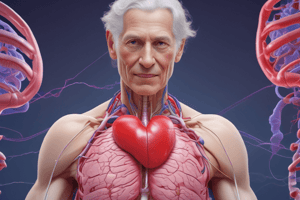Podcast
Questions and Answers
What impact did Napoleon have on administrative divisions in the regions under French control?
What impact did Napoleon have on administrative divisions in the regions under French control?
- He simplified administrative divisions. (correct)
- He complicated administrative divisions.
- He maintained the existing administrative divisions.
- He expanded administrative divisions.
How did Napoleon's policies affect the feudal system in Europe?
How did Napoleon's policies affect the feudal system in Europe?
- He ignored the feudal system.
- He abolished the feudal system. (correct)
- He reinforced the feudal system.
- He modified the feudal system.
What change occurred in guild restrictions in towns due to Napoleon's policies?
What change occurred in guild restrictions in towns due to Napoleon's policies?
- Guild restrictions were removed. (correct)
- Guild restrictions were strengthened.
- Guild restrictions were expanded.
- Guild restrictions were maintained.
What was a notable improvement made by Napoleon in transport and communication systems?
What was a notable improvement made by Napoleon in transport and communication systems?
How were French soldiers depicted in the print by Karl Kaspar Fritz?
How were French soldiers depicted in the print by Karl Kaspar Fritz?
How were the French armies initially received in places like Holland, Switzerland, Brussels, Mainz, Milan, and Warsaw?
How were the French armies initially received in places like Holland, Switzerland, Brussels, Mainz, Milan, and Warsaw?
Why did the initial enthusiasm for the new administrative arrangements turn to hostility?
Why did the initial enthusiasm for the new administrative arrangements turn to hostility?
How did businessmen and small-scale producers benefit from the uniform laws and common national currency?
How did businessmen and small-scale producers benefit from the uniform laws and common national currency?
What is represented in Fig. 5 where Napoleon is shown as a postman losing territories?
What is represented in Fig. 5 where Napoleon is shown as a postman losing territories?
Why were there no 'nation-states' in mid-eighteenth-century Europe as we know them today?
Why were there no 'nation-states' in mid-eighteenth-century Europe as we know them today?
What characterized Eastern and Central Europe during the time period described in the text?
What characterized Eastern and Central Europe during the time period described in the text?
What effect did the new administrative arrangements have on political freedom according to the passage?
What effect did the new administrative arrangements have on political freedom according to the passage?
During which period did the Greek struggle for independence begin?
During which period did the Greek struggle for independence begin?
Which event marked the unification of Italy?
Which event marked the unification of Italy?
In which region of Europe did industrialization begin in the second half of the eighteenth century?
In which region of Europe did industrialization begin in the second half of the eighteenth century?
Which group was not a part of the social classes that emerged with industrialization?
Which group was not a part of the social classes that emerged with industrialization?
In which regions of Europe was the pattern of landholding characterized by vast estates cultivated by serfs?
In which regions of Europe was the pattern of landholding characterized by vast estates cultivated by serfs?
Which event sparked revolutions in Europe where artisans, industrial workers, and peasants revolted against economic hardships?
Which event sparked revolutions in Europe where artisans, industrial workers, and peasants revolted against economic hardships?
Flashcards are hidden until you start studying




